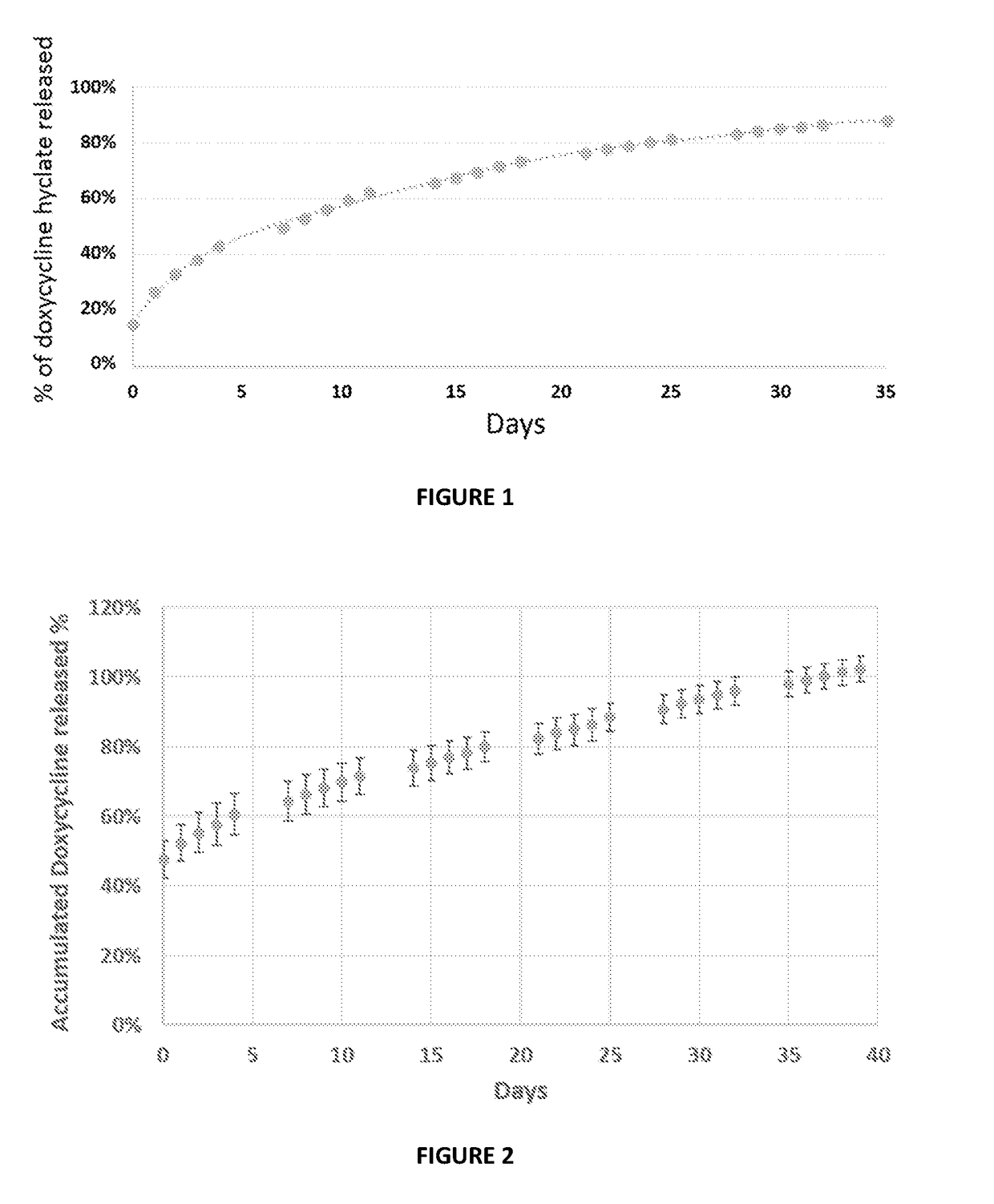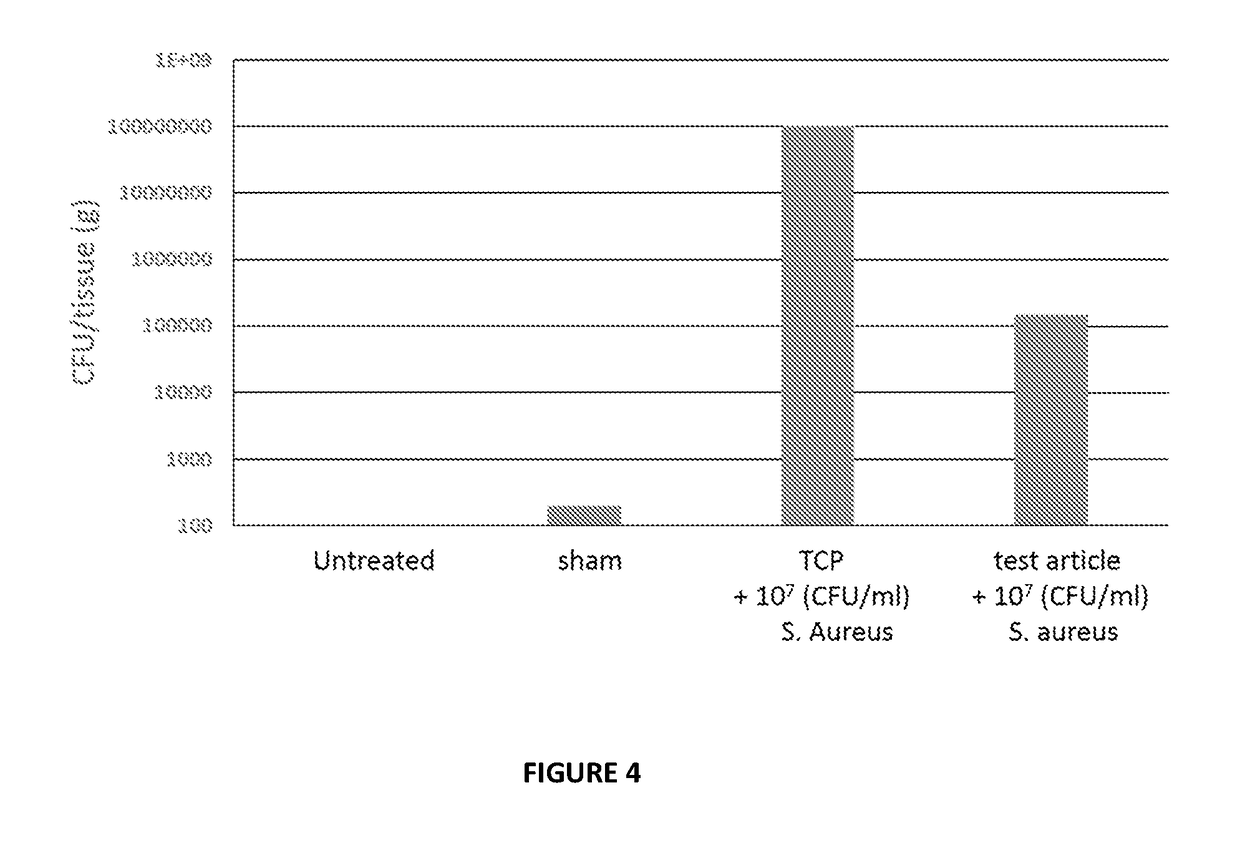Compositions and methods for the treatment and prophylaxis of surgical site infections
a surgical site infection and composition technology, applied in the field of sustained release compositions, can solve the problems of increased economic burden on healthcare systems, increased postoperative hospital duration and costs, yeast species and viral pathogens also pose a risk, etc., and achieve the effect of suppressing or preventing surgical site infections
- Summary
- Abstract
- Description
- Claims
- Application Information
AI Technical Summary
Benefits of technology
Problems solved by technology
Method used
Image
Examples
example 1
or the Preparation of a Substrate (e.g. Tri-Calcium Phosphate Particles, Poly Vinyl Alcohol Particles) Coated / Impregnated with a Doxycycline Containing Matrix Composition According to Certain Embodiments of the Invention (for the Treatment and Prevention of Surgical Site Infections)
[0126]Overview: To produce lipid-saturated polymer matrices, two mixtures are created.
[0127]1. A biodegradable polymer and a first lipid component (e.g. sterol) are mixed with a volatile organic solvent, which is mixed to yield a solution or suspension of lipid-saturated polymer matrix, as measured by its differential scanning calorimetric (DSC) profile.
[0128]2. The active agent and a second lipid component (e.g. at least one phospholipid) are mixed with a second volatile organic solvent to yield a second solution or suspension.
[0129]3. The two solutions or suspensions are combined and mixed until equilibrium is reached.
[0130]4. A substrate (e.g. gelatin sponge, collagen foam, mineral substrate) is then m...
example 2
ase from PVA Particles Impregnated / Coated with the Sustained Release Formulation of the Invention
[0148]Coated / impregnated PVA particles were prepared as described above in Example 1. Following hydration (5% serum at 37° C.) the release of doxycycline from the PVA particles impregnated / coated with the matrix composition was detected and quantified by HPLC. The release profile is presented in FIG. 2.
[0149]As can be seen in FIG. 2, the first hour release reached about 45% of the doxycycline in the coating matrix. Further investigation the first hour release revealed that when the collected sample was centrifuged (spin-down) and further sieved (45 um filter) or vice versa (sieved and further centrifuged), the amount of the doxycycline released within the first hour and detected by HPLC was lower by at least 50% (e.g. ˜20%). Without being bound by theory or mechanism of action, it is estimated that the collected sample (before centrifuging and / or filtering the collected sample) includes ...
example 3
ase from Absorbable Gelatin Sponge Containing the Sustained Release Formulation of the Invention
[0154]A 1 cm*1 cm piece of collagen sponge was placed in a 20 ml vial. 0.4 ml of solution AB (as described above in Example 1) were added to the vial and the vial was left closed at room temperature for 10 min. The piece of collagen sponge impregnated with solution AB was transferred to a 4 ml vial for evaporation of the solvents followed by vacuum overnight. This collagen piece was put to release experiment.
[0155]Following hydration (5% serum at 37° C.) the release of doxycycline from the gelatin sponge piece impregnated with the matrix composition into the surrounding was detected and quantified by HPLC.
PUM
| Property | Measurement | Unit |
|---|---|---|
| particle size | aaaaa | aaaaa |
| diameter | aaaaa | aaaaa |
| diameter | aaaaa | aaaaa |
Abstract
Description
Claims
Application Information
 Login to View More
Login to View More - R&D
- Intellectual Property
- Life Sciences
- Materials
- Tech Scout
- Unparalleled Data Quality
- Higher Quality Content
- 60% Fewer Hallucinations
Browse by: Latest US Patents, China's latest patents, Technical Efficacy Thesaurus, Application Domain, Technology Topic, Popular Technical Reports.
© 2025 PatSnap. All rights reserved.Legal|Privacy policy|Modern Slavery Act Transparency Statement|Sitemap|About US| Contact US: help@patsnap.com



